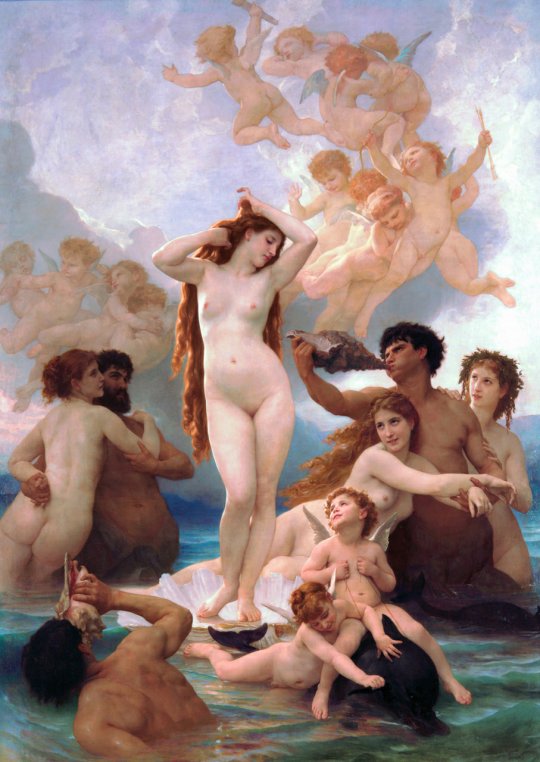
William-Adolphe Bouguereau La naissance de Vénus 1879

I was going to do a good news only Debt Rattle, but I’m afraid I’ve come up a tad short. Not a lot of good news around. I’m sure if I’d go looking for it, I’d find more, but I always want stories to come to me. I thought of just skipping the whole thing, but now that we’ve come this far….. Merry Christmas.
Baldwin’s offer is funnier than the impersonations.
• Alec Baldwin Offers To Play Inauguration: ‘I Wanna Sing Highway To Hell’ (G.)
Alec Baldwin has made President-elect Donald Trump an offer to play at his inauguration on 20 January. His song of choice? AC/DC’s Highway to Hell. The actor who did a recurring impression of Trump on Saturday Night Live throughout 2016, made the tongue-in-cheek offer on Twitter, after a string of high profile names refused the gig. Elton John, Andrea Bocelli and Gene Simmons are among the performers who have reportedly turned Trump down. The only confirmed acts so far are the Mormon Tabernacle Choir, America’s Got Talent contestant Jackie Evancho, and the Rockettes, although the Beach Boys are rumoured to be considering playing.
Baldwin and Trump have clashed on social media after the actor began impersonating him on SNL. In November, Trump wrote: “I watched parts of @nbcsnl Saturday Night Live last night. It is a totally one-sided, biased show – nothing funny at all. Equal time for us?” Baldwin’s withering response, reminded Trump that after the election there is no equal time rule. “There is no more equal time. Now u try 2 b Pres + ppl respond. That’s pretty much it.”

Heartbreaker.
• Terminally Ill Dutch Boy Raises £2 Million With Nail-Painting Challenge (G.)
A terminally ill six-year-old Dutch boy, who hoped to raise a few hundred euros by daring people to paint their nails, has raised more than €2.5m. Tijn Kolsteren, who was diagnosed with brain cancer in May, launched the appeal just three days ago, but it fired the imagination of the Dutch public. The charity drive ended on Saturday. “With his nail-painting dare he wanted to help children suffering from pneumonia,” the Dutch public broadcaster NOS reported. “It was an enormous success – from DJ Armin van Buuren to prime minister Mark Rutte, and many other famous celebrities had their nails painted.” The donation page urged people: “Paint your nails, make a donation and then challenge three of your friends to do the same.” It invited participants to share their pictures on social media using the hashtag #lakaan (meaning “the polish is on”).
The appeal is part of a traditional event in the Netherlands where radio DJs lock themselves away for without food or drink to raise money. This year, proceeds are going to the Red Cross. Rutte joined the DJs late on Friday and opted for a deep blue for his own nails. Tijn’s family learned only last week that a course of chemotherapy had failed to reduce the size of his cancer. “Despite this bad news, we wanted to do something for children who won’t maybe even make it to six,” his father, Gerrit, told NOS. “We came up with the idea together: Tijn had already painted his nails with a friend and liked it. I wanted to do something similar to the ice bucket challenge and men painting their nails is a bit taboo,” he added, referring to the internet craze that raised money and awareness for amyotrophic lateral sclerosis.


A woman after my heart. Obviously. Konstantinos always tries, when possible, to give refugees the ingredients and let them cook their own food. They love that.
• Syrian Chef Serves Up Slice Of Home In Greek Camp (AFP)
Before braving a ‘trip of death’ to escape Syria, Talal Rankoussi was a chef in a Damascus restaurant considered the largest in the world. Bawabet Al Dimashq – Damascus Gate – still holds that distinction in the Guinness Book of Records as it can seat over 6,000 people. So when 41-year-old Talal was asked by a US benefactor to spice up the meals for several hundred fellow Syrians at the Ritsona camp near Athens, the two-decade culinary veteran did not hesitate. The father of three, who crossed the Aegean in February in “a trip of death, riding a plastic tyre in an ocean under the rain”, says the food handed out in the camp “is undercooked…with no regard to improving the quality.”
Like most refugee camps in Greece, Ritsona receives daily meals from catering companies commissioned by the army. But in terms of quality and nutritional value, it “just covers survival needs,” says a camp operator who declined to be named. “It’s been a challenge just to get the caterers to send pitta bread instead of white bread,” the operator says, adding that “sometimes we have 200 meals left over that nobody wants to eat.” Then came Carolynn Rockafellow, an American former investment banker who moved to Greece last year after a 30-year career, including two decades at Credit Suisse. Rockafellow, originally from New York, has taken a personal interest in the well-being of Ritsona’s 700 refugees, nearly half of them children.
With personal funds and donations from friends, Rockafellow has created Cafe Rits, offering alternative cuisine out of one of the camp’s few brick-and-mortar buildings. “I feel this story is as much about helping the Greeks as it is about helping the refugees,” Rockafellow says over the sound of Talal furiously chopping vegetables. “This is a very tough situation for Greece and I think they’re doing a great job,” says the woman whose nickname around the camp is Madame Sharba, or Mrs Soup.

Curious.
• An Illegal Hub For Paywalled Science Papers (Nature)
It took Alexandra Elbakyan just a few years to go from information-technology student to famous fugitive. In 2009, when she was a graduate student working on her final-year research project in Almaty, Kazakhstan, Elbakyan became frustrated at being unable to read many scholarly papers because she couldn’t afford them. So she learnt how to circumvent publishers’ paywalls. Her skills were soon in demand. Elbakyan saw scientists on web forums asking for papers they couldn’t access – and she was happy to oblige. “I got thanked many times for sending paywalled papers,” she says. In 2011, she decided to automate the process and founded Sci-Hub, a pirate website that grabs copies of research papers from behind paywalls and serves them up to anyone who asks. This year, interest in Sci-Hub exploded as mainstream media cottoned on to it and usage soared.
According to Elbakyan’s figures, the site now hosts around 60 million papers and is likely to serve up more than 75 million downloads in 2016 – up from 42 million last year and, by one estimate, encompassing around 3% of all downloads from science publishers worldwide. It is copyright-breaking on a grand scale — and has brought Elbakyan praise, criticism and a lawsuit. Few people support the fact that she acted illegally, but many see Sci-Hub as advancing the cause of the open-access movement, which holds that papers should be made (legally) free to read and reuse. “What she did is nothing short of awesome,” says Michael Eisen, a biologist and open-access supporter at the University of California, Berkeley. “Lack of access to the scientific literature is a massive injustice, and she fixed it with one fell swoop.”
For the first few years of its existence, the site flew under the radar — but eventually it grew too big for subscription publishers to ignore. In 2015, the Dutch company Elsevier, supported by the wider publishing industry, brought a US lawsuit against Elbakyan on the basis of copyright infringement and hacking. If Elbakyan loses, she risks having to pay many millions of dollars in damages, and potentially spending time in jail. (For that reason, Elbakyan does not disclose her current location and she was interviewed for this article by encrypted e-mail and messaging.) In 2015, a US judge ordered Sci-Hub to be shut down, but the site popped up on other domains. It’s most popular in China, India and Iran, she says, but a good 5% or so of its users come from the United States. Elbakyan has found her name splashed across newspapers, and says she typically gets a hundred supportive messages a week, some with financial donations.
She says she feels a moral responsibility to keep her website afloat because of the users who need it to continue their work. “Is there anything wrong or shameful in running a research-access website such as Sci-Hub? I think no, therefore I can be open about my activities,” she says. Critics and supporters alike think that the site will have a lasting impact, even if it does not last. “The future is universal open access,” says Heather Piwowar, a co-founder of Impactstory, a non-profit firm incorporated in Carrboro, North Carolina, which helps scientists track the impact of their online output. “But we suspect and hope that Sci-Hub is currently filling toll-access publishers with roaring, existential panic. Because in many cases that’s the only thing that’s going to make them actually do the right thing and move to open-access models.”

As funny as it is sad.
• The Radical Jesus (Whitehead)
However, had Jesus been born in the year 2016… Rather than traveling to Bethlehem for a census, Jesus’ parents would have been mailed a 28-page American Community Survey, a mandatory government questionnaire documenting their habits, household inhabitants, work schedule, how many toilets are in your home, etc. The penalty for not responding to this invasive survey can go as high as $5,000. Instead of being born in a manger, Jesus might have been born at home. Rather than wise men and shepherds bringing gifts, however, the baby’s parents might have been forced to ward off visits from state social workers intent on prosecuting them for the home birth. One couple in Washington had all three of their children removed after social services objected to the two youngest being birthed in an unassisted home delivery.
Had Jesus been born in a hospital, his blood and DNA would have been taken without his parents’ knowledge or consent and entered into a government biobank. While most states require newborn screening, a growing number are holding onto that genetic material long-term for research, analysis and purposes yet to be disclosed. Then again, had his parents been undocumented immigrants, they and the newborn baby might have been shuffled to a profit-driven, private prison for illegals where they would have been turned into cheap, forced laborers for corporations such as Starbucks, Microsoft, Walmart, and Victoria’s Secret. There’s quite a lot of money to be made from imprisoning immigrants, especially when taxpayers are footing the bill.
From the time he was old enough to attend school, Jesus would have been drilled in lessons of compliance and obedience to government authorities, while learning little about his own rights. Had he been daring enough to speak out against injustice while still in school, he might have found himself tasered or beaten by a school resource officer, or at the very least suspended under a school zero tolerance policy that punishes minor infractions as harshly as more serious offenses. Had Jesus disappeared for a few hours let alone days as a 12-year-old, his parents would have been handcuffed, arrested and jailed for parental negligence. Parents across the country have been arrested for far less “offenses” such as allowing their children to walk to the park unaccompanied and play in their front yard alone.
Rather than disappearing from the history books from his early teenaged years to adulthood, Jesus’ movements and personal data—including his biometrics—would have been documented, tracked, monitored and filed by governmental agencies and corporations such as Google and Microsoft. Incredibly, 95% of school districts share their student records with outside companies that are contracted to manage data, which they then use to market products to us. From the moment Jesus made contact with an “extremist” such as John the Baptist, he would have been flagged for surveillance because of his association with a prominent activist, peaceful or otherwise. Since 9/11, the FBI has actively carried out surveillance and intelligence-gathering operations on a broad range of activist groups, from animal rights groups to poverty relief, anti-war groups and other such “extremist” organizations.
Jesus’ anti-government views would certainly have resulted in him being labeled a domestic extremist. Law enforcement agencies are being trained to recognize signs of anti-government extremism during interactions with potential extremists who share a “belief in the approaching collapse of government and the economy.” While traveling from community to community, Jesus might have been reported to government officials as “suspicious” under the Department of Homeland Security’s “See Something, Say Something” programs. Many states, including New York, are providing individuals with phone apps that allow them to take photos of suspicious activity and report them to their state Intelligence Center, where they are reviewed and forwarded to law-enforcement agencies.
Rather than being permitted to live as an itinerant preacher, Jesus might have found himself threatened with arrest for daring to live off the grid or sleeping outside. In fact, the number of cities that have resorted to criminalizing homelessness by enacting bans on camping, sleeping in vehicles, loitering and begging in public has doubled. Viewed by the government as a dissident and potential threat to its power, Jesus might have had government spies planted among his followers to monitor his activities, report on his movements, and entrap him into breaking the law. Such Judases today—called informants—often receive hefty paychecks from the government for their treachery.
Had Jesus used the internet to spread his radical message of peace and love, he might have found his blog posts infiltrated by government spies attempting to undermine his integrity, discredit him or plant incriminating information online about him. At the very least, he would have had his website hacked and his email monitored. Had Jesus attempted to feed large crowds of people, he would have been threatened with arrest for violating various ordinances prohibiting the distribution of food without a permit. Florida officials arrested a 90-year-old man for feeding the homeless on a public beach.









